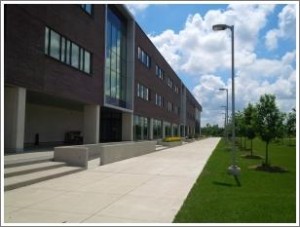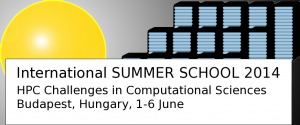ANNOUNCEMENTS
Dear SciNet users,
To keep users posted on what’s going on at SciNet, we send monthly emails with the new features, planned courses, events and accomplishments at SciNet.
Last month, the SciNet team was augmented with another analyst, Mike Nolta. Welcome, Mike!
Below you will find the salient points of what else happened or changed recently and what will happen in the near future. Among these is the announcement and call for participant applications for the International High Performance Computing Summer School, to be held in Toronto. As always, details on SciNet events are available on the wiki and the SciNet education website.
– The SciNet team
UPCOMING EVENTS
Unless stated otherwise, all events take place at the SciNet Conference Room on the second floor of 256 McCaul Street, Toronto. All events at SciNet are free for users but we ask that you enroll on the education website: https://support.scinet.utoronto.ca/education .
- INTRO TO SCINET
Wednesday March 11, 10:30 am – 11:30 am
The “Intro to SciNet” is a class of approximately 90 minutes where you will learn how to use the systems. Experienced users may still pick up some valuable pointers during these sessions.
Participation counts towards the SciNet HPC Certificate.
For more information and enrollment, go to https://support.scinet.utoronto.ca/education/go.php/171/index.php
Future “Intro to SciNet” dates and enrollment links:
Apr 8, 10:30 am – 11:30 am: https://support.scinet.utoronto.ca/education/go.php/172/index.php
May 13, 10:30 am – 11:30 am: https://support.scinet.utoronto.ca/education/go.php/173/index.php
Jun 10, 10:30 am – 11:30 am: https://support.scinet.utoronto.ca/education/go.php/174/index.php
- SCINET USER GROUP MEETING
Wednesday March 11, 12:00 noon – 1:00 pm
The SciNet Users Group (SNUG) meetings are every month on the second Wednesday, and involve pizza, user discussion, feedback, and a half-hour talk on topics or technologies of interest to the SciNet community.
TechTalk: “Job and Queue Management Tools” by Mike Nolta (SciNet)
For more information and enrollment, go to https://support.scinet.utoronto.ca/education/go.php/183/index.php
Future SNUGs:
Apr 8, 2015, 12:00 noon – 1:00 pm, TechTalk TBD
May 13, 2015, 12:00 noon – 1:00 pm, TechTalk TBD
Jun 10, 2015, 12:00 noon – 1:00 pm, TechTalk TBD
- SCIENTIFIC COMPUTING COURSE: HIGH PERFORMANCE COMPUTING
March/April 2015
Part 3 of the Scientific Computing Course (part 1 was given in January and part 2 is in progress). Each part consists of eight lectures of one hour.
Note that these parts can be taken as “mini-courses” by astrophysics graduate students and as “modular courses” by physics and chemistry graduate students.
Participation in part 3 counts towards the SciNet HPC Certificate.
For more information (soon) and enrollment, go to https://support.scinet.utoronto.ca/education/go.php/178/index.php
Enrollment for part 1 and 2 is closed.
- DEADLINE APPLICATION INTERNATIONAL SUMMER SCHOOL ON HPC IN TORONTO
Wednesday March 11, 2015
See below for information regarding this summer school.
- INTRODUCTION TO CUDA
Tuesday April 14, 9:00 am – 5:00 pm
The goal of this course is for incoming students, new to GPGPU but familiar with scientific programming in C or C++, to leave being able to start writing simple kernels for their own problems, and understand the tools, techniques and libraries that will be needed to improve and optimize the results.
Participation counts towards the SciNet HPC Certificate.
For more information (soon) and enrollment, go to https://support.scinet.utoronto.ca/education/go.php/179/index.php
- RELATIONAL DATABASE BASICS
Wednesday May 6, 9:30 – 5:00 pm
As a form to manage data, relational databases are widely used in the back-end of many websites as well as for data mining computations. In this course, we will look at the basics of relational databases: What are they, and what are they useful for? We will also consider why they are not all that much used in the context of scientific computing, using SQLite and Python.
Participation counts towards the SciNet Scientific Computing Certificate.
For more information (soon) and enrollment, go to https://support.scinet.utoronto.ca/education/go.php/186/index.php
- ONTARIO HPC SUMMER SCHOOL CENTRAL 2015
Dates: TDB
Details to be posted soon.
- COMPUTE ONTARIO RESEARCH DAY
Thursday May 21, Conestoga College Institute of Technology and Advanced Learning, Cambridge, Ontario
A day filled with high performance computing related research done in Ontario. Have an interesting research story for which you used high performance computing (such as the facilities at SharcNet, SciNet, and HPCVL)? Want to share you experience with other Ontario HPC users? Consider giving a talk at the meeting.
More details to follow.
- HPCS 2015: HIGH PERFORMANCE COMPUTING SYMPOSIUM IN MONTREAL
Montreal, June 15-19
Registration is now open for the 29th annual HPCS conference (Canada’s foremost supercomputing conference). This conference will take place in Montreal, June 15-19, the first two days of which are tutorials on advanced research computing and high performance computing. This year’s theme is `Advanced Computing and Big Data – Driving Competitiveness and Discovery’.
More information and registration can be found at http://www.hpcs.ca .
- INTERNATIONAL SUMMER SCHOOL ON HPC CHALLENGES IN COMPUTATIONAL SCIENCES
Sunday June 21 – Friday June 26, Toronto, Canada
In this summer school, leading American, Canadian, European and Japanese computational scientists and HPC technologists will offer instruction on a variety of topics, including HPC challenges by discipline (e.g., bioinformatics, computer science, chemistry, and physics), HPC programming proficiencies, performance analysis & profiling, algorithmic approaches & numerical libraries, data-intensive computing and scientific visualization.
Compute Canada/Calcul Canada invites students enrolled in science and engineering fields, and researchers in those fields, at Canadian post-secondary institutions to apply for one of 10 spots allocated to Canada.
The application deadline is March 11, 2015.
For more information see https://ihpcss2015.computecanada.ca
SYSTEM NEWS
- BGQ now a single 4-rack system. bgqdev-fen1 is the single login/devel/submission node.
- GPC: Cmake 3.1.0 available as a module.
- GPC: kernel upgraded to 2.6.32-504.3.3.el6.x86_64. Its base OS remains unchanged.
- GPC: emacs 24.4 available as a module.
- GPC: intel/15.0 module is deprecated — use 15.0.1 instead.
- GPC, BGQ: git/1.9.5 is available as a module.
- GPC: Nwchem 6.5 installed as a moduled.
WHAT’S NEW ONLINE?
The SciNet Wiki can be found at http://wiki.scinethpc.ca and contains technical information on how to use the systems. The SciNet Education and Training site can be found at https://support.scinet.utoronto.ca/education and contains the material of SciNet’s training and education material.
- Wiki: PDF of the January SNUG Techtalk about “Data Management and Transfer Tools at SciNet” Wiki: How to run parallel R.
- Wiki: BGQ page updated to reflect its new 4-rack configuration.
- Education: recordings of the first lectures on in the “Scientific
- Computing” and “Numerical Tools” mini-course.
WHAT HAPPENED AT SCINET IN THE LAST MONTH?
- Jan 14 and Feb 11: Intro to SciNet
- Jan 21: Introduction to the Linux Shell
- Jan: Eight lectures of the mini-course “Scientific Computing”
- Feb: Four lectures of the mini-course “Numerical Tools for Physical Sciences”
- Feb 11: SciNet User Group Meeting with TechTalk on “Data Management and Transfer Tools”
- Feb 13: SciNet analysts participated as judges in the final of the Big Data Challenge for High School Students.







